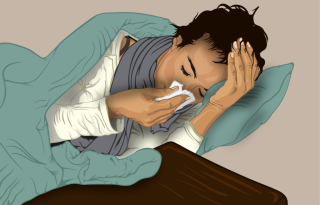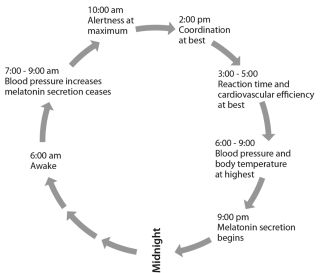Circadian Rhythm
Why Are Cold Symptoms Worse at Night?
Understanding changes in suffering from mild COVID, flu, RSV, and common colds.
Posted January 19, 2024 Reviewed by Davia Sills
Key points
- The body clocks within people regulate the intensities of their immune system defenses.
- The mind protects the body in synchronization with circadian rhythms.
- Secretions of hormones work best at night.

Every symptom of sickness seems to get worse at night. Perhaps lying prone or supine in bed prevents gravity from draining mucus in nasal and sinus passages. The mucus builds up with nowhere to go. The cough increases rapidly as it does its job, attempting to clear out mucus that carries away your enemy microbes.
But lying flat in bed is not the only reason, though it might have some small contribution to coughing at night. I had a recent week of combatting the flu. I was fine during the day, but at almost precisely 5:00 p.m. every day, my coughing became significantly worse. That was hours before my bedtime. The kick-off was my body clock telling my immune system to turbocharge its job. Many animals, insects, and plants live by body clocks synchronized to circadian rhythms. They perform best at certain hours of the day.
When enemy viruses or bacteria enter our bodies, our healthy immune systems secrete the weapons and troopers of body war: mucus, fevers, headaches, joint pains, and coughs, what we call symptoms. They are the good guys that protect us from cell damage and organ impairment. In other words, the symptoms are not the diseases; they come from a healthy network of biological systems timed to coordinate with how the organs of the body function. Those functions rely on internal rhythms adjusted by external events. In particular, the positions of the sun and moon. Many organisms follow the time of day without external cues.
One way of thinking about why our cold and virus symptoms worsen at night is that we are a bundle of clocks built from a feedback loop system that operates by a specific gene expression with a relatively short half-life. In essence, at least in the simplest explanation, protein levels in the cytoplasm accumulate until they reach a threshold sometime in the middle of the night when they enter the nucleus and begin to repress transcription from gene instructions. Then, toward morning, they turn protein building off. As the sun rises, the proteins decay. After several hours, the proteins are gone from the nucleus.
As the day turns to evening, the gene turns on to restart transcription, and so the approximate 24-hour loop begins again. Oscillation is entirely controlled by the rate at which proteins accumulate in the cytoplasm. That rate matches the 24-hour day-night loop, synchronized to light information routed from the retina to the suprachiasmatic nucleus (SCN), an autonomous pacemaker that plays a circadian role.
So, again, why do nasty symptoms become worse at night? The pacemaker indirectly detects neural signals of light and darkness from the eyes to play a central role in regulating the body’s circadian activity rhythms through sleep-wake cycles involving the brain and trillions of peripheral clocks embedded in almost every cell of the body, including organ cells that get to work on secreting hormones such as melatonin and other chemical messengers responsible for maintaining bodily functions such as appetite, body temperature, blood pressure, heart rate, quick motor reactions, and tissue repair.[i] Those functions are reasonably locked in a coordinated tempo that coincides with the biochemical necessities of staying alive and healthy. Time sorting is essential for the body’s survival. The mind protects the body it sits in. That’s its job.
A cold, the flu, or COVID-19 requires the development of weapons to combat pathogens. So, symptoms are worse at night because that is the time for tissue repair and reflexively coughing up any phlegm that has drowned the body’s enemies.

Approximately between 6:00 and 9:00 p.m., blood pressure and body temperature are highest. That is the most advantageous time interval for immune responses to do its work in building new cells and attacking any interference.
Sitting up and not lying in bed from 6:00 to 9:00 p.m., coughs begin their reflexive job of getting rid of pathogens. The lying flat theory might have something to do with coughing, but the worse-at-night major cause comes down to circadian rhythms governing how the immune system takes advantage of hormone secretions, heart rate, and body temperature. The mind and body function best by the clock.
References
David K. Welsh, Joseph S. Takahashi, and Steve A. Kay, (2010) “Suprachiasmatic Nucleus: Cell Autonomy and Network Properties,” Annual Review Physiology, 72, pp. 551-577.
Satchin Panda, The Circadian Code: Lose Weight, Supercharge Your Energy, and Transform Your Health from Morning to Midnight (New York: Rodale Books, 2018) 32.
Joseph Mazur, The Clock Mirage: Our Myth of Measured Time (New Haven & London: Yale University Press, 2020) 190.


